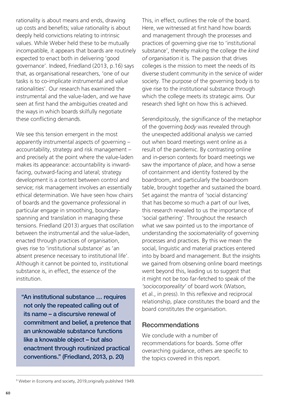
60
This, in effect, outlines the role of the board.
Here, we witnessed at first hand how boards
and management through the processes and
practices of governing give rise to 'institutional
substance', thereby making the college the kind
of organisation it is. The passion that drives
colleges is the mission to meet the needs of its
diverse student community in the service of wider
society. The purpose of the governing body is to
give rise to the institutional substance through
which the college meets its strategic aims. Our
research shed light on how this is achieved.
Serendipitously, the significance of the metaphor
of the governing body was revealed through
the unexpected additional analysis we carried
out when board meetings went online as a
result of the pandemic. By contrasting online
and in-person contexts for board meetings we
saw the importance of place, and how a sense
of containment and identity fostered by the
boardroom, and particularly the boardroom
table, brought together and sustained the board.
Set against the mantra of 'social distancing'
that has become so much a part of our lives,
this research revealed to us the importance of
'social gathering'. Throughout the research
what we saw pointed us to the importance of
understanding the sociomateriality of governing
processes and practices. By this we mean the
social, linguistic and material practices entered
into by board and management. But the insights
we gained from observing online board meetings
went beyond this, leading us to suggest that
it might not be too far-fetched to speak of the
'sociocorporeality' of board work (Watson,
et al., in press). In this reflexive and reciprocal
relationship, place constitutes the board and the
board constitutes the organisation.
Recommendations
We conclude with a number of
recommendations for boards. Some offer
overarching guidance, others are specific to
the topics covered in this report.
9 Weber in Economy and society, 2019,originally published 1949.
" An institutional substance … requires
not�only�the�repeated�calling�out�of�
its�name�-�a�discursive�renewal�of�
commitment and belief, a pretence that
an unknowable substance functions
like�a�knowable�object�-�but�also�
enactment through routinized practical
conventions."�(Friedland,�2013,�p.�20)
rationality is about means and ends, drawing
up costs and benefits; value rationality is about
deeply held convictions relating to intrinsic
values. While Weber held these to be mutually
incompatible, it appears that boards are routinely
expected to enact both in delivering 'good
governance'. Indeed, Friedland (2013, p.16) says
that, as organisational researchers, 'one of our
tasks is to co-implicate instrumental and value
rationalities'. Our research has examined the
instrumental and the value-laden, and we have
seen at first hand the ambiguities created and
the ways in which boards skilfully negotiate
these conflicting demands.
We see this tension emergent in the most
apparently instrumental aspects of governing -
accountability, strategy and risk management -
and precisely at the point where the value-laden
makes its appearance: accountability is inwardfacing, outward-facing and lateral; strategy
development is a contest between control and
service; risk management involves an essentially
ethical determination. We have seen how chairs
of boards and the governance professional in
particular engage in smoothing, boundaryspanning and translation in managing these
tensions. Friedland (2013) argues that oscillation
between the instrumental and the value-laden,
enacted through practices of organisation,
gives rise to 'institutional substance' as 'an
absent presence necessary to institutional life'.
Although it cannot be pointed to, institutional
substance is, in effect, the essence of the
institution.